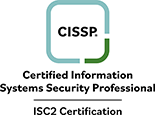Unable to find what you're searching for?
We're here to help you find itCertified Information Systems Security Professional (CISSP) Course Overview
The Certified Information Systems Security Professional (CISSP) is the most globally recognized certification in the information security market. For cybersecurity professionals seeking to advance into leadership positions and demonstrate mastery of enterprise-level security management, the cybersecurity CISSP credential represents the gold standard in information security professional certification.
That's one of the reasons the CISSP is currently the most sought-after cybersecurity certification by employers, according to Cyberseek. It is also the most popular certification for mid and senior-level cybersecurity professionals, with over 160,000 holders. This comprehensive guide examines the strategic value of CISSP certification, providing expert insights into requirements, preparation methodologies, and career advancement potential.
CISSP validates an information security professional's comprehensive expertise across both technical implementation and strategic management domains. Unlike purely technical certifications, CISSP bridges the gap between hands-on security work and executive-level decision making, making certified professionals invaluable for organizations navigating complex threat landscapes.
The certification's authority stems from its rigorous standards: In June 2004, the CISSP designation was accredited under the ANSI ISO/IEC Standard 17024:2003. It is also formally approved by the U.S. Department of Defense (DoD) in their Information Assurance Technical (IAT), Managerial (IAM), and System Architect and Engineer (IASAE) categories for their DoDD 8570 certification requirement. This recognition ensures CISSP holders meet stringent professional standards across government and private sectors.
The certification's prestige extends internationally, with The UK National Academic Recognition Information Centre assessed the CISSP qualification as a Level 7 award, the same level as a master's degree. This academic equivalency reflects the depth and breadth of knowledge required, positioning CISSP holders alongside graduate-level professionals in organizational hierarchies.
The experience requirements for CISSP certification ensure candidates possess substantial real-world expertise before attempting the examination. Candidates must have a minimum of five years cumulative, full-time experience in two or more of the eight domains of the current CISSP Exam Outline
The ISC² experience requirements are precisely structured to validate practical competency:
Full-Time Professional Experience: Your work experience is accrued monthly. Thus, you must have worked a minimum of 35 hours/week for four weeks in order to accrue one month of work experience. This ensures candidates have sustained exposure to cybersecurity challenges rather than sporadic project involvement.
Part-Time and Alternative Pathways: Your part-time experience cannot be less than 20 hours a week and no more than 34 hours a week. 1040 hours of part-time = 6 months of full time experience · 2080 hours of part-time = 12 months of full time experience.
Purchase This Course
USD
View Fees Breakdown
| Course Fee | 2,990 |
|
Total Fees (with exam) |
2,990 (USD) |
USD
View Fees Breakdown
| Course Fee | 2,300 |
|
Total Fees (with exam) |
2,300 (USD) |
USD
View Fees Breakdown
| Flexi Video | 16,449 |
| Official E-coursebook | |
| Exam Voucher (optional) | |
| Hands-On-Labs2 | 4,159 |
| + GST 18% | 4,259 |
|
Total Fees (without exam & Labs) |
22,359 (INR) |
|
Total Fees (with Labs) |
28,359 (INR) |
Select Time
Select Date
| Day | Time |
|---|---|
|
to
|
to |
♱ Excluding VAT/GST
You can request classroom training in any city on any date by Requesting More Information
Inclusions in Koenig's Learning Stack may vary as per policies of OEMs
Scroll to view more course dates
You can request classroom training in any city on any date by Requesting More Information
♱ Excluding VAT/GST
*Inclusions in Koenig's Learning Stack may vary as per policies of OEMs
Certified Information Systems Security Professional (CISSP)
Suggestion submitted successfully.
Koenig Learning Stack
Inclusions in Koenig's Learning Stack may vary as per policies of OEMs



